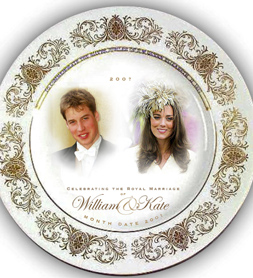Prince William and Kate Middleton’s wedding: who will pay?
The wedding of Prince William and Kate Middleton could empty the Queen’s reserve funds ahead of her Diamond Jubilee in 2012, Channel 4 News discovers.

Despite the eight year courtship of the couple, it would seem there is no reserve fund in place for the biggest royal event since Prince Charles married Lady Diana Spencer in 1981.
Unless Parliament votes for extra money to be allocated to Prince William and Miss Middleton’s wedding, the cost will have to be borne by the Civil List – the Queen’s household allowance – or drawn from Her Majesty’s personal wealth.
“The Commons voted to give the Queen extra money for her wedding in the 40s – despite the post-war austerity.” Prof Vernon Bogdanor
Professor Vernon Bogdanor, a constitutional historian who taught Prime Minister David Cameron at Oxford, told Channel 4 News: “It is a matter of judgement for Cameron.
“As I recall the Commons voted to give the Queen extra money for her wedding in the 40s – despite the post-war austerity it was thought that the event would bring colour and was worth splashing out on. But more recently – people were annoyed when John Major said we’d pay for the fire damage at Windsor Castle.”
The Treasury could not confirm to Channel 4 News if it has any contingency plan or reserve funds in place for Prince William’s wedding.
Meanwhile, Buckingham Palace would not comment on the likely cost of the event. A spokesman for Clarence House told Channel 4 News: “They have not even decided on a date yet, let alone cost. But the couple are very mindful of the current economic situation”.
The ring
The full cost of Prince Charles and Diana’s wedding 1981 was not reported. However, Diana chose an engagement ring worth £85,700 in today’s terms. Costing £30,000 in 1981, the ring was the size of a walnut, featuring 14 diamonds surrounding a sapphire made by crown jewellers Garrard.
This is, however, one saving this time, as it’s been announced that William has given his mother’s ring to his fiancee.
Diana’s extravagant wedding dress, with a 25-foot train, was valued at £9,000, or £25,700 today – more than the cost of the average £21,000 cost of a complete wedding in the UK today.
Last year, the Queen drew on a reserve fund, built up during the 1990s, to boost her Civil List by £6.5m.
Her Majesty’s Civil List – which foots the bill for the Royal Household including staff salaries – amounted to £14.2m in 2009, up £300,000 from the year before. The government contributed £7.9m.
During the 1990s period of low-inflation, the Queen set aside £35m from the Civil List and agreed to freeze her income.
The Queen’s reserve fund is expected to run out by her Diamond Jubilee in 2012 if she continues to dip into it at the same rate.
Spending cuts
In the wake of last month’s Comprehensive Spending Review, the Queen agreed to cut total Royal Household spending by 14 per cent in 2012/13. It was also announced that Buckingham Palace had cancelled its £50,000 Christmas Party.
The Department for Culture, which pays £15m a year towards the upkeep of the Royal palaces, has already demanded that maintenance costs for the palaces and Royal travel costs be reduced by 25 per cent.
There will however be a temporary grant of £1m extra to support the cost of the Diamond Jubilee, which is set to take place on the first weekend in June 2012.
Prince William and Miss Middleton’s wedding however, will come a year ahead of the much feted jubilee, adding enormous pressure to the government’s depleted coffers and threatening the Queen’s reserve funds further.
The Queen may be forced to dip into her personal wealth, estimated at £290m by The Times Rich List.
Most likely to play host to the wedding is the City of Westminster, home to Westminster Abbey – where the Queen herself was married in 1947.
Westminster Council’s budget for the year 2010/11 has been set at £818m.
A spokesman for the council said if the wedding does take place in Westminster, the council would not be responsible for the security of the event or its guests, but would have to foot the bill for the safety of the public on the streets.
Who Knows Who? Kate Middleton: welcome to the firm
62p per person
Last year, the British monarchy cost the taxpayer £38.2m – or 62 pence per person. However this did not include security costs.
While many companies will doubtless offer their services for the wedding free of charge, security costs are likely to be vast. Security for Prince William’s cottage in Wales alone currently costs the taxpayer an estimated £1.4m.
Earlier this year, Sweden’s Crown Princess Victoria married her personal trainer Daniel Westling, costing the Swedish taxpayer $11.4m – triggering much controversy in this age of austerity and a debate within the country over the future of the monarchy.